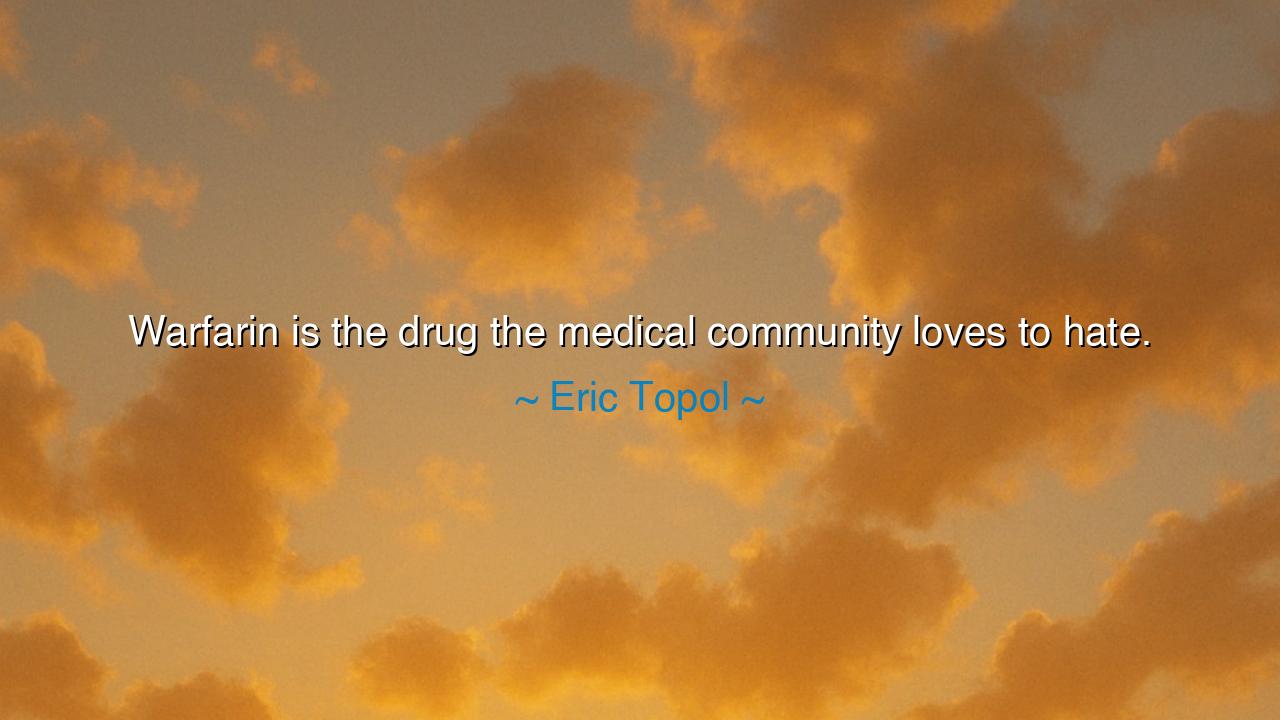
Warfarin is the drug the medical community loves to hate.






The words of Eric Topol—“Warfarin is the drug the medical community loves to hate”—are both ironic and profound, capturing the uneasy relationship between necessity and imperfection that defines much of human progress. In his statement lies a paradox that stretches beyond medicine into the fabric of life itself: that what sustains us may also burden us, that what saves lives can also endanger them. Warfarin, a humble anticoagulant born from a tragic discovery, has long stood as both savior and adversary—a medicine revered for its power to prevent death, and despised for its unpredictability and risk.
To understand Topol’s insight, one must look to the origin of Warfarin. Its story begins not in a laboratory of healing, but in the cold fields of the American Midwest in the 1920s, where farmers watched their cattle die from mysterious internal bleeding. The culprit was found to be spoiled sweet clover hay, which contained a chemical that thinned the blood beyond recovery. From this calamity came coumarin, and later, through study and refinement, Warfarin—named after the Wisconsin Alumni Research Foundation, which sponsored its creation. What was once poison became cure, a testament to humankind’s genius for turning tragedy into triumph. Yet, as with all great powers, the gift came with a curse.
For decades, Warfarin has been the guardian of hearts, protecting millions from strokes and clots. It is one of the most prescribed drugs in the history of medicine. But it demands precision and patience, for the line between healing and harm is razor-thin. A small change in diet, a forgotten dose, or a single interaction with another medication can transform the medicine into danger. The patient must walk carefully, and the physician must watch constantly. It is this delicate balance—the daily negotiation between salvation and peril—that gives rise to Topol’s statement. The medical world depends on Warfarin, yet resents its flaws. It is a companion they cannot abandon, yet cannot fully trust.
In this tension lies a reflection of the ancient dualities that have always governed human endeavor: fire that warms and burns, water that nourishes and drowns, power that builds and destroys. Warfarin, in its way, is like these primal forces—a tool of immense potential bound by danger. Topol’s words remind us that medicine, for all its brilliance, is never absolute. Even the most successful treatments are born from imperfection. The wise physician, like the ancient healer, must therefore approach every cure with reverence and humility, aware that the line between mastery and mistake is narrow indeed.
There is a story that echoes this truth in another age. The Greek physician Hippocrates, father of medicine, once taught his students that “all things in excess are opposed to nature.” He warned that the same herbs that heal can also kill when misused. His wisdom endures in the story of Warfarin, a medicine that has saved untold lives precisely because it is handled with respect. Those who wield it carelessly learn that in healing, as in all of life, control without humility invites ruin. The physician who "loves to hate" Warfarin is not ungrateful, but mindful—aware that its dangers teach vigilance, and its complexity demands reverence.
Topol’s insight also reflects a deeper philosophical truth about human invention. Every advancement carries the shadow of its imperfection. In seeking control over nature, we often create tools that reveal our own limitations. Warfarin’s arrival forced medicine to confront the limits of precision, to acknowledge that healing cannot be mechanized entirely. Even with modern monitoring and digital systems, the art of care still depends upon judgment, empathy, and discipline—qualities of the human spirit that no machine can replace. The "love-hate" relationship with Warfarin, therefore, mirrors humanity’s eternal dance with its own creation: proud of its genius, humbled by its fragility.
The lesson of this quote is both scientific and moral: to respect the instruments of power we create, even when they frustrate us. In medicine, as in life, what we “love to hate” often reveals our deepest dependencies. The wise do not reject imperfection—they learn to live within it, mastering their tools without arrogance and embracing progress without blindness. The physician must learn patience, the patient must learn trust, and both must remember that the pursuit of healing is a path, not a destination.
So, my child, remember the story of Warfarin when you wield any power—whether of knowledge, art, or invention. Do not despise the tools that challenge you, for they are your teachers. Do not curse the imperfections of life, for they are the forge of wisdom. Love what you hate, and hate what you love, with awareness, for within that balance lies mastery. As Eric Topol reminds us, even in the heart of medicine’s frustration lies its greatest triumph—the commitment to heal despite imperfection, and to seek progress without forgetting humility.






AAdministratorAdministrator
Welcome, honored guests. Please leave a comment, we will respond soon